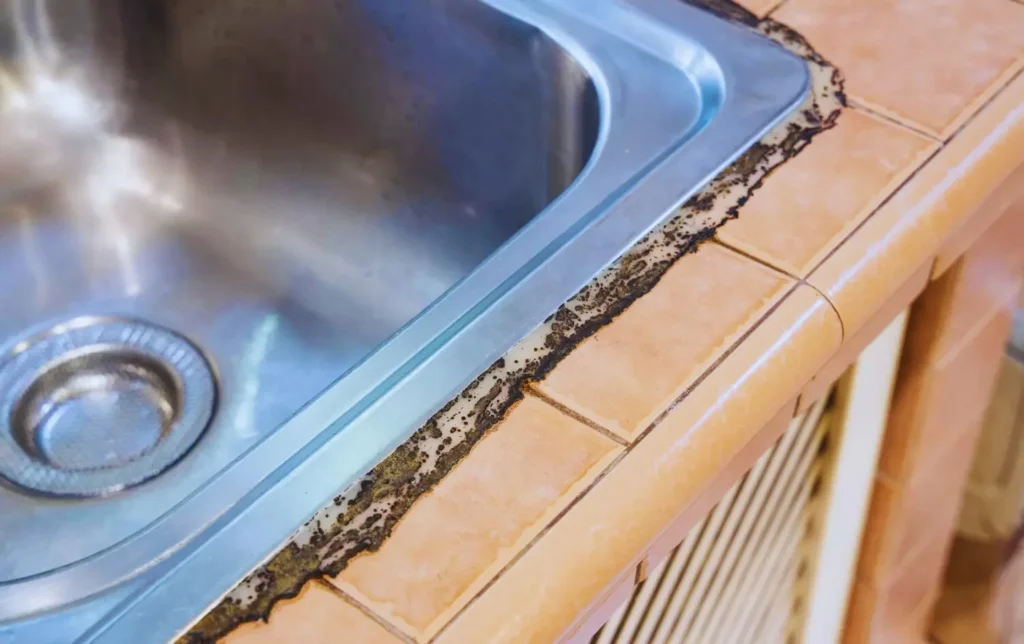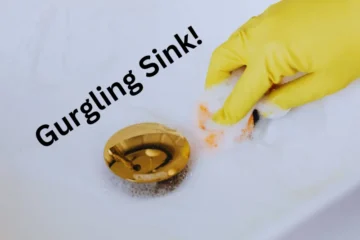You are not alone if you observe water pooling around your kitchen sink. A kitchen sink leaking from top is a common issue, but it can lead to a serious problem if left unaddressed. One of the most used areas in kitchen chores is the kitchen sink. It is used for many purposes. Whether you wash dishes, fetch a glass of water, or fill a bottle, it can be annoying if your kitchen sink leaks from the top. In this article, we will tell you the causes, solutions, and prevention of leakage in the future.
Table of Contents
Causes of Kitchen Sink Leaking from the Top
Faulty Faucet
One of the common causes of kitchen sink leaks is faucet leakage. If your faucet is very old, poor quality, or not properly maintained, it can cause leakage.
Worn-Out Seals
Improper sealing is also a cause of leakage. Seals help prevent water leakage, but water can leak into your kitchen sink if they are damaged. For example, if the seal between the sink and countertop is damaged, it causes leakage.
Damaged Sink Rim
If the sink’s rim is damaged, it can also cause leaks. The sink rim can be damaged if the rim is not properly sealed with the countertop. It often occurs when the sink is not installed correctly.
Identifying the cause of Leakage
Before fixing the leak, it is important to identify the main cause of the leakage. The following steps help you do this.
Inspecting the Faucet and Seals
If water pools around the base or dips down the sides and you observe any moisture, then the faucet is the cause of the leakage. A damaged seal can also cause leakage. Check the seal between the sink and countertop. If the seal is damaged, it means that that seal is the cause of leakage.
Checking the Sink Rim and Countertop
The rim is another area that can cause leakage. Check the moisture around the edges and rim of the sink. If you feel moisture, it means that the rim is likely the cause of leakage.
How to fix kitchen leaking?
Tools and Materials You’ll Need
Before repairing the sink, gathering tools and materials to fix the leakage is necessary.
Essential Tools for Sink Repair
For sink repairs, you’ll need a wrench, screwdriver, and plumber’s tape. These tools will help you disjoin the faucet and replace worn-out parts.
Optional Tools for Advanced Repair
If you face a complex issue, such as a damaged sink rim, you need additional tools, such as sealant and a caulking gun. These tools assist you in adequately sealing the countertop and sink.
Guide to Fixing a Leaking Faucet
After identifying the cause of the leakage, the next step is to fix the problem. Follow these steps to repair a leaking faucet.
Closed the Water Supply
Before you begin, turn off the water valve to stop the water supply. This blocked valve will help you prevent further leakage and water waste.
Disjoining the Faucet
Next, use a wrench or screwdriver to disjoin the faucet. Remove the handle, spout, and any other material that needs to be removed. Keep track of all the parts so you can join the faucet later.
Replacing Worn-Out Parts
After disjoining the faucet, analyze all its components. If you observe any damaged parts, such as worn-out cartridges or washers, replace them with new ones. This will stop the leak and make your faucet work properly.
Repairing Worn-Out Seals
If the seal is the cause of the leak between the sink and countertop, then change the seal between them. Changing leaks is a simple process that can be done in a few steps.
Identifying Damaged Seals
Analyze the seal to determine whether it is damaged. If you find any gaps or cracks, it is a sign of a damaged seal, and you must change it.
Replacing Sink Seals Properly
before changing the seal, remove the old one, and clean the seal area. Then, apply a new sealant layer and press the new seals into place.
Fixing a Damaged Sink Rim
If the leakage is caused by the sink rim, you will need to repair it to stop the water from leaking. To repair the rim, apply a new layer of sealant to it.
Inspecting the Rim for Damage
first of all, identify whether your rim is damaged or not. If the rim is cracked, chipped, or gapped, it is damaged, and you need to change or replace it.
Precautions to Avoid Future Leaks
After fixing the leak, it is important to take some steps to prevent the sink from leaking again. Regular maintenance and upgrades can prevent your kitchen sink from leaking again.
Regular Maintenance Tips
To prevent your sink from leaking in the future, regularly analyze the condition of your sink and faucet. If you observe any issues, identify the cause and repair it.
Upgrading Your Sink and Faucet
Check the condition of your faucet, whether it is old or new, and upgrade it with a new one. New sinks and faucets are manufactured to be more durable and efficient, and they minimize the risk of leakage.
When to Call a Professional Plumber
While many sink leaks can be fixed with a little DIY solution, if your problem is not solved by a DIY solution, it’s best to call in a professional. If you’re not confident in fixing the leak or if the problem is beyond your knowledge, it’s time to bring in an expert.
Signs Your DIY Effort Isn’t Enough
If you try several times to stop leaking but it doesn’t work or you experience additional issues, it’s time to call a plumber. A professional plumber can identify the problem and provide a permanent solution.
Finding a Reliable Plumber
When choosing a plumber, look for a professional, experienced, certified plumber. Ask friends or family for advice, or check online reviews to find a reliable plumber.
Cost of Fixing
The cost of fixing a leaking kitchen sink can vary depending on the cause of leakage, whether it is a minor cause or significant cause, and whether you choose to DIY or hire a professional. Here is the estimated cost of fixing.
Estimating DIY Repair Cost
If you are repairing the leak, the cost will depend on the quality of the material and tools needed. Basic materials such as worn-out washers or seals may cost a few dollars. However, complex materials such as sink rims could cost more.
Professional Repair Costs
Hiring a professional for the repair can cost more, but it will save you time and help you do the job correctly. The cost will depend upon the difficulty of the repair and the rates charged by the plumbers. The average charge for plumbers is between $150$ and $300$.
Impact of a Leaking Sink on Your Kitchen
Water Damage to Countertops
The leaking kitchen sink damaged the countertops. If water is allowed to pool around the sink, it can cause the countertop material to swell, warp, or discolor. Replacing the countertop will cost a lot.
Mold Growth
A linking kitchen sink may also cause mold growth. If left untreated, mold can cause serious health issues. If you observe any signs of mold, it is essential to solve the problem immediately.
READ MORE: How to remove mold sling from kitchen sink?

Conclusion:
A leaking kitchen sink is not a minor issue. If it is not resolved immediately, it may lead to a significant problem. Understand why your kitchen sink is leaking, how to fix the problem, and how to prevent it from leaking. By knowing these questions, you can keep your kitchen in top condition. If you need to improve at repairing, then call a professional. They can fix your problem efficiently and prevent future damage to your kitchen sink.
FAQ’s
How Can I Prevent Future Leaks?
Regular maintenance, such as checking the seals between the countertop and sink rim and the condition of the faucets, can prevent future leaks.
Is It Worth Upgrading to a High-Quality Faucet?
Yes, upgrading to a high-quality faucet can prevent leaks and extend the life span of the sink.
Can a Leaking Sink Cause Health Issues?
Yes, the leaking sink caused health issues. The leaky sink may have caused the growth of mold, which can cause health issues if left untreated.





